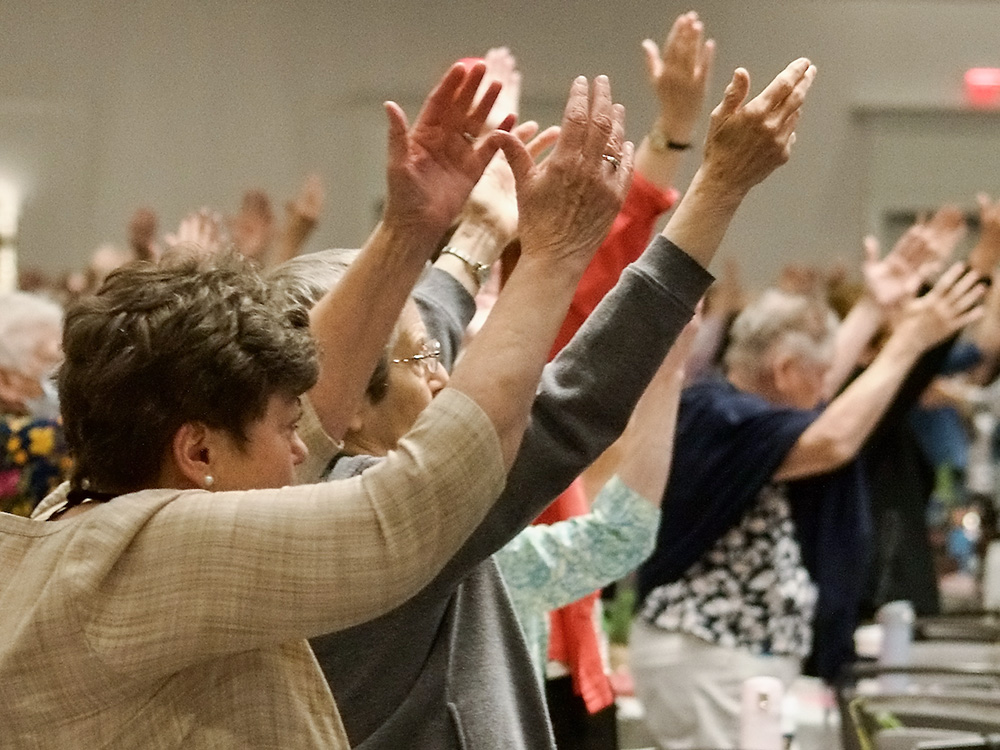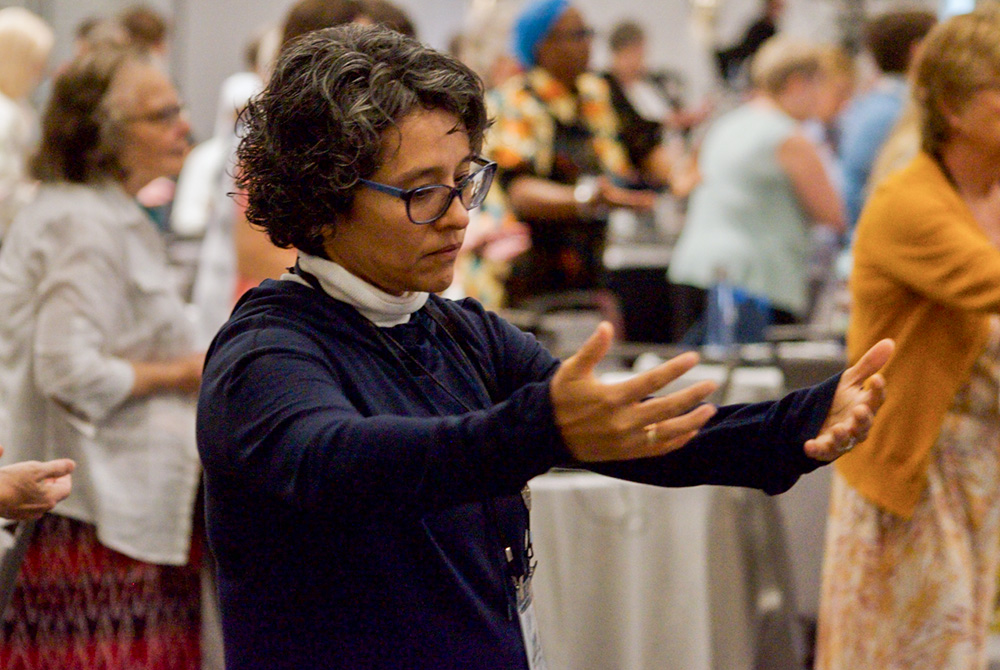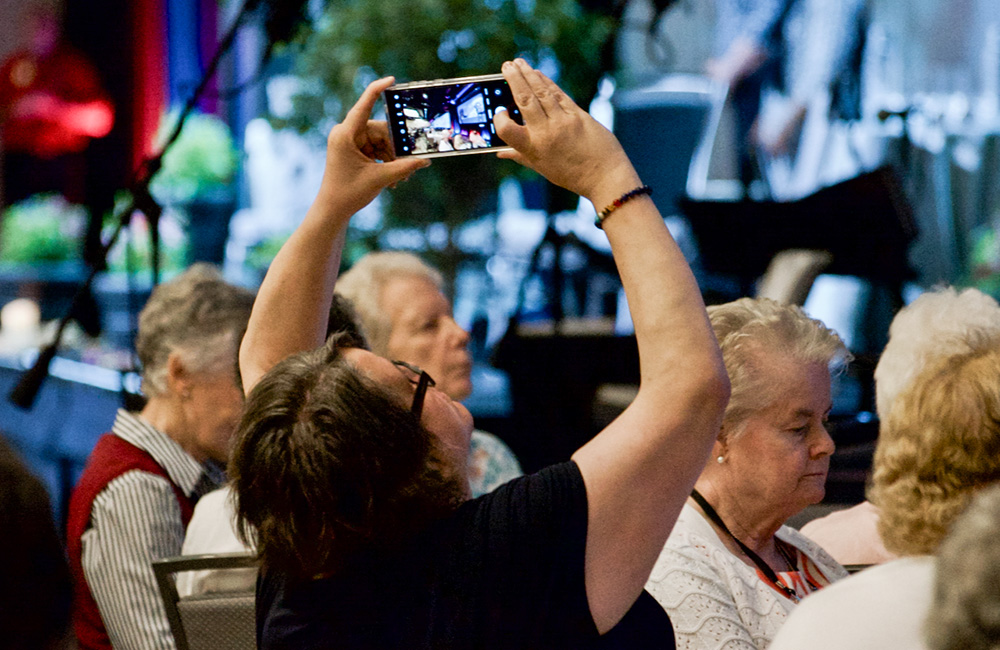
Sisters pray Aug. 15 at the Leadership Conference of Women Religious assembly in Orlando, Florida. (GSR photo/Dan Stockman)
The 2024 Leadership Conference of Women Religious assembly was a deeply moving few days for me. The speeches all seemed to incorporate a theme of "not yet," "interim," "liminal," "transitional," places in life that are uncomfortable for someone who loves clarity.
But, sticking with it, the image that came to me as I listened was that of a threshold, standing before a door that we have been knocking on and now is squeakily opening!
The LCWR assembly was a visual of that squeaky opening for me because on this threshold was a diversity I have never before experienced at these assemblies. We have been talking about widening our tents, being more inclusive and we have made progress in varying degrees, but never like this time. The diversity was amazing. It was colorful, in dress, skin color, music and language.
Sr. Maria Elena Martinez, a Sister of St. Francis, our facilitator, wore a dress that reflected this diversity well. She was clothed in brilliant colors, gracefully expressing her ethnic identity. Her demeanor was welcoming in and out of the assembly gatherings. For me, she was a focus of the diversity and joy of the whole.
The clothing of sisters and lay guests from far-off places and brilliant bouquets of languages in prayers, liturgies and speeches was amazing: Spanish, Vietnamese, French, Tagalog, Creole, dialects of other languages, and of course English spoken with many accents. It was exciting to experience us all together standing on the threshold of a new era that Fr. Bryan Massingale reminded us was an image of Pope Francis. A whole new era is huge to try to envision.

Sisters pray Aug. 15 at the Leadership Conference of Women Religious assembly in Orlando, Florida. (GSR photo/Dan Stockman)
"Who are we to be?" was a question and theme we pondered and, like the reign of God, the answer was among us already, if we had eyes to see and ears to hear. The assembly body reflected "Who are we now," most likely not totally where the Gospel calls us, but on the way to the vision of radical hospitality that Benedictine Sr. Maricarmen Bracamontes described as a "relational process embracing all creation and manifesting divine truth, goodness and beauty."
As Maureen Geary, president of LCWR and a Grand Rapids Dominican, also laid out, we are in an exploration time and so, "path one has been ... a good start, but not enough" as adventures never end, according to Dr. Seuss. Religious life, and each of us, probably struggles with ambiguity and many questions, but as Maureen reminded us, it is precisely the questions that will show us the way.
One current question that continues to mystify our society is how to move out of "othering" and fear of those who are different. Bracamontes told us that it takes mystical-prophetic experience to recognize "the other revealed to me in my own flesh."
Her quote from Isaiah 58:7 is powerful: "Is it not to share your bread with the hungry and to bring the homeless poor into your house; when you see the naked, to cover him and not to hide yourself from your own flesh?"
'Who are we to be?' was a question and theme we pondered and, like the reign of God, the answer was among us already, if we had eyes to see and ears to hear.
It seems contemplative prayer is the best experience of radical hospitality, where we are invited to encounter the "other," to know our own vulnerability and that of God's as well. In these meetings of God, we gradually come to deep awareness of our self that leads us to recognize the other.
All the speeches stirred hope in me, as did being part of the assembled group of women and men who have spent years of contemplation opening to the diversity of God and learning how to " hold the world in our arms." This "holding" of the suffering and joys of our world has led us by words, attitudes and actions to help build relational and egalitarian hospitality, while at the same time grieving the loss of a world we helped build.
The value of lamenting and grieving what we are leaving behind was significant for me to hear, being someone who prefers "getting on with things."
Advertisement
I loved the definitions of lament as verb and noun and recalled my first night in Zambia when keening filled the dark night, triggering in me a deep fear, not being familiar with such loud wailing. Perhaps Indigenous groups are better at lament than we Westerners. But I have learned in my own life that when I don't take time to be hospitable to the pain, it surfaces later in ways that are more painful.
Anne Munley, a member of the Sisters, Servants of the Immaculate Heart of Mary, presented her report on trends in U.S. religious life outlining some of the new places it is currently traveling.
She noted that women religious have new ways of articulating identity and charism, letting go of accomplishment-oriented lives and recognizing more deeply that mission is being the presence of love as Jesus was. Leaders are learning new ways of leading as they are challenged with demographic shifts, intergenerational living, and greater awareness of interdependence.
She noted a strong emphasis on spirituality and discernment in building new visions of identity, along with recognizing that Western religious life has been dominant in our diverse world, and now needs to actively de-Westernize in order to live in solidarity with others for a shared future. The "other" can open new ways of praying, leading and living mission. Newer members are open to these shifts and not afraid of an unknown future.

St. Joseph of Peace Sr. Susan Francois takes a photo Aug. 15 at the Leadership Conference of Women Religious assembly in Orlando, Florida. (GSR photo/Dan Stockman)
We women religious are together on this new threshold challenged to "cultivate the ability to dwell in unknowing, to co-exist with tensions and uncertainty, to lean into the mystery of God's leading." It is learning and giving into lament that opens these doors for us and helps us live in joy and hope and to be a witness of both in our chaotic world.
Part of lament is storytelling and poetry, and the speakers skilfully used both, adding joy and laughter, enriching the concepts they shared. Both storytelling and poetry also helped me listen at a deeper level, realizing that listening deeply to others' stories is another aspect of radical hospitality.
At our Global Sisters Report exhibit booth there was lots of storytelling. Many of the 800 sisters stopped to share their stories and those of their sisters in many parts of the world. They also shared what they liked about the website, and offered suggestions of writers that could be tapped.
We had fun photos taken by columns editor Sr. Helga Leija and social/multimedia editor Olivia Bardo, storing the colorful memories of these encounters.
I returned home with a deep gratitude of being able to participate in this assembly and grateful to all of those who created theater that spoke truth and gave hope for our shared future.







